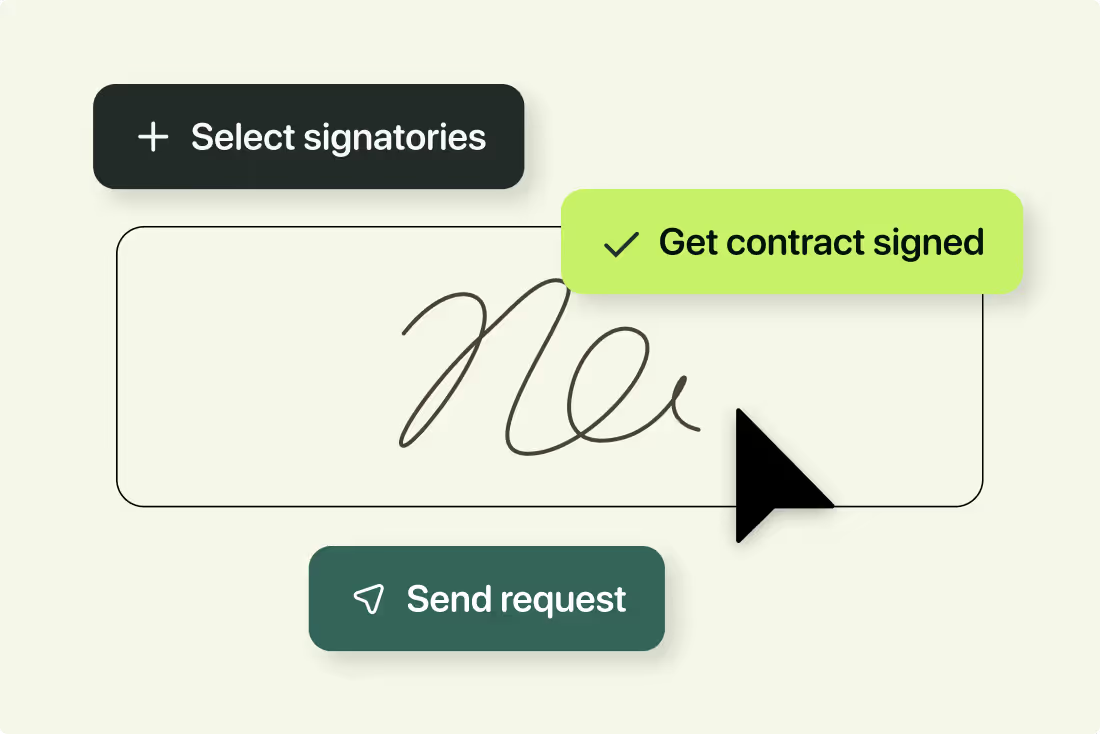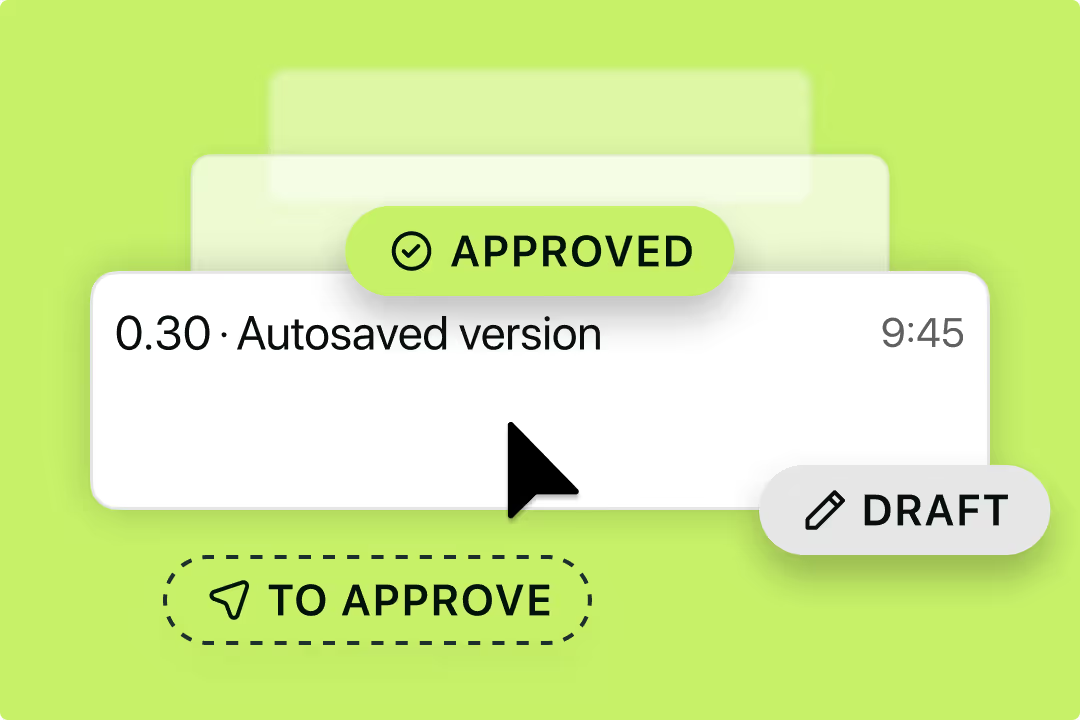Solutions
Customer Support
Resources
This guide gives you the clarity you need to manage procurement contracts effectively. You’ll learn when to use which contract, what to watch out for, and how to reduce the back-and-forth when managing them – and get trusted tips to help you get to ‘signed’ faster.
A procurement contract is a legal document that sets the terms for buying goods or services – who’s doing what, when, how much it’ll cost, and what happens if things go off track.
This isn’t just legal paperwork. It’s how you stay in control: locking in costs, setting expectations, and avoiding the dreaded “but we thought...” conversations later on.
Take a simple example – buying IT equipment. If your contract’s vague on delivery or quality, you could end up with the wrong kit, delivered late, and no clear fix in sight.
But with clear terms (and a few well-placed penalty clauses), everyone knows what’s expected – and what happens if something goes wrong.

Different contracts suit different situations, from fixed prices to flexible scopes, one-offs to long-term partnerships. The key is knowing which one fits best.
This section breaks down the most common procurement contract types, when to use them, and what to watch out for – so you can pick the right one and reduce risk from day one.
A fixed-price contract sets a non-negotiable price for the work. You agree on a clear scope and deliverables – and the supplier takes on the risk if costs run over.
Ideal when scope is predictable – like ordering equipment or standard services. Popular in the public sector where budget certainty matters.
Scope creep. If requirements shift, suppliers may push back or delay. Keep scope tight and penalties clear.
A cost-reimbursable contract shifts the risk balance. Instead of agreeing a fixed price, the buyer agrees to cover the supplier’s actual costs – plus a pre-agreed fee. That could be a fixed amount, a percentage of cost, or a performance-based incentive.
Best for projects with undefined scope – like R&D or innovation work – where change is expected. Cost plus contracts are commonly used in construction projects, for example. Grab a copy of Juro’s cost plus construction contract template here.
Costs can spiral. Set clear expense rules, monitor progress, and cap spend where possible.
A time and materials (T&M) contract is all about flexibility. You pay the supplier for hours worked and materials used. There’s no fixed price – just a flexible setup that scales with the work.
Use it when the scope is unclear or evolving – great for agile projects or fast starts.
Costs can balloon without oversight. Add checkpoints and track hours closely to stay on budget.
A Master Services Agreement (MSA) sets the ground rules for a long-term relationship. It’s a framework contract that covers the standard legal and commercial terms between a buyer and a supplier – so you don’t have to renegotiate them every time you kick off a new project.
Ideal for long-term supplier relationships with repeat projects. Common in IT, consulting, and logistics.
Make sure the MSA fits your risk profile. Review it regularly – what worked two years ago might not now.
Check out these tips from Juro’s GC, Michael Haynes, on how to optimize your MSA. Or, get started with Juro’s MSA template.
An SOW defines the specific work under an MSA – outlining deliverables, timelines, and costs for one project.
When you need clarity on what’s being done, by when, and for how much – especially for defined, one-off projects.
Ambiguity slows everything down. Be specific, and tailor each SOW to the project – no lazy copy-paste jobs. It's fine to kick off with an SOW template, but you'll need to personalize it to your specific use case.
A Purchase Order (PO) is a buyer-issued document that confirms an order for goods or services. Once accepted by the supplier, it becomes a binding contract. It’s simple, standardized – and widely used for everyday procurement.
Perfect for routine buys – like office supplies or software licences – especially when terms are already agreed.
POs aren’t enough for complex deals. Make sure they align with your wider contract process – or things might fall through the cracks. Want a rough idea what your PO should look like? This Purchase Order template can help.
A Framework Agreement (also known as an Indefinite Delivery/Indefinite Quantity or IDIQ contract) sets up terms for future purchases – without locking in quantities or timing. It’s the legal equivalent of saying, “We’ll call you when we need you.”
When you expect multiple orders over time but need flexibility. These agreements are common in public sector and large-scale procurement.
Make sure teams know how to use it. Track performance across orders to avoid missed obligations or overspending.
A consultancy agreement sets the terms for bringing in external expertise. It outlines what the consultant will do, how much they’ll be paid, who owns the output, and what happens if things go off track.
When you’re hiring experts for short-term or project-based work.
Clarify who owns the work produced. Watch for overreaching liability limits or vague deliverables.
Get started in minutes with Juro’s consulting agreement templates:
A subcontractor agreement outlines the terms for hiring a third party to deliver part of a larger project.
Use this contract when you’re engaging a third party to deliver specific tasks under a broader contract, and you want to set clear guardrails and responsibilities.
Always flow down the key terms from your main contract – especially around delivery standards, liability, and IP. If your subcontractor causes a delay, you might still be on the hook.
Need visibility across the chain? Juro’s audit trail and contract repository make it easy to track subcontractor commitments alongside your main supplier agreements.
Or, if you’re ready to get started, check out Juro’s subcontractor agreement template here.
An addendum updates an existing contract, without you needing to start from scratch.
When you’re changing scope, extending timelines, or adding compliance terms mid-contract.
Keep wording clear and avoid conflicts with the original terms. Stay on top of version control to reduce risk.
Pro tip: Use Juro’s smart fields to auto-sync key data across contract versions – no more tracking changes in spreadsheets.
Get started with Juro’s procurement addendum template here.
You don’t need to memorise every contract type – you just need to know what fits where.
Here’s a quick guide to help you choose the right procurement contract based on your project, budget, and risk appetite.
Picking the right contract is only half the battle. The real magic? Managing it properly once it’s signed.
To stay compliant, move quickly, and avoid nasty surprises, you need a smarter way to handle procurement contracts from end to end.
Here are a few top tips on how to do this:

By following the recommendations above, you can ensure smooth sailing from draft to renewal.
Better yet, Juro's contract management platform is designed for legal and business teams, offering all of the functionality listed above.
The outcome? Legal and procurement teams collaborate effortlessly on contract management, reducing delays and keeping on top of those pesky post-signature obligations.
To find out what's possible, hit the button below.

Procurement contracts aren’t set in stone. The way that companies buy, partner, and manage risk is changing fast – and your contracts need to keep up.
Here are the trends shaping procurement in 2026 (and beyond):
ESG clauses relating to sustainability, ethical sourcing, and carbon reporting are becoming more common in supplier contracts. According to the World Commerce And Contracting Association (WCC), 75 per cent of buyers and 59 per cent of suppliers surveyed have now incorporated additional ESG clauses into their contract.
More companies are setting goals to work with diverse-owned businesses. For example, Unilever's states “We want to actively make our supply chain more diverse by reaching out to people from groups who’ve been under-represented up to now”.
As a result, contracts are increasingly starting to include commitments to inclusive sourcing and reporting metrics.
The shift to agile ways of working means more flexible contracts, phased deliverables, and adaptive scopes. According to WCC’s ‘State of Agility in Procurement and Supply” report, ‘Lean Agile procurement appears to be the new industry standard in both procurement and supply”.
To keep pace, procurement teams need contracts that evolve with the work. Agile delivery needs agile agreements.
Leading procurement teams are using tools like Juro to create, approve and track contracts in minutes – not days. For example, Juro customer Talentful has reduced time-to-sign by 70 per cent with contract automation.
CLM platforms are surfacing insights from contract data – helping teams negotiate smarter, spot risks earlier, and improve vendor performance over time.
According to MDLBEAST’s General Counsel, Faisal Al-Alamy, “We really value the data Juro provides, and we find it extremely helpful for forecasting contract workload throughout the year, particularly in the run up to our biggest events. It’s a great high-level planning tool in that regard.”
Procurement contracts don’t need to be scary, but they do need to be spot on. The right one helps you move fast, stay compliant, and keep your budget in check. The wrong one? That’s how you end up with delays, disputes, and awkward calls about overspend.
By understanding the different types of procurement contracts – and when to use each – you’re already ahead of the curve. Once you add in smart contract management, you’ve got a recipe for faster deals, tighter compliance, and a lot less firefighting.
Need a faster, easier way to handle contracts? Juro’s got you covered – from first draft to final signature (and everything after).
Get started with our contract templates, or fill out the form below to see how Juro can work for your team.
The right contract depends on how predictable the scope is, how much risk you’re willing to carry, and how long the supplier relationship will last. Clear scope favors fixed-price; uncertainty favors cost-reimbursable or T&M.
An MSA sets the overarching legal and commercial terms for a long-term supplier relationship, while an SOW defines the specific scope, deliverables, and pricing for individual projects under that MSA.
Yes. Once accepted by the supplier, a purchase order becomes a binding contract — but it’s usually only suitable for simple, low-risk purchases.
Because costs aren’t fixed, buyers carry the risk of overruns. Without spend caps, reporting requirements, and strong oversight, costs can escalate quickly.
They establish pre-agreed terms for future purchases without committing to volume or timing. Individual orders are placed later under the framework.
Ambiguous scope, weak change control, unclear pricing, misaligned liability caps, and poor version control are the most common sources of procurement disputes.
By centralizing contracts, using standardized templates, automating approvals and reminders, and tracking obligations and performance metrics in a CLM platform.
As soon as contract volume or complexity increases. CLM tools like Juro reduce admin, improve visibility, and help procurement teams move faster without increasing risk.
Lorem ipsum dolor sit amet, consectetur adipiscing elit. Suspendisse varius enim in eros elementum tristique. Duis cursus, mi quis viverra ornare, eros dolor interdum nulla, ut commodo diam libero vitae erat. Aenean faucibus nibh et justo cursus id rutrum lorem imperdiet. Nunc ut sem vitae risus tristique posuere.

